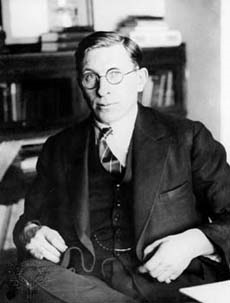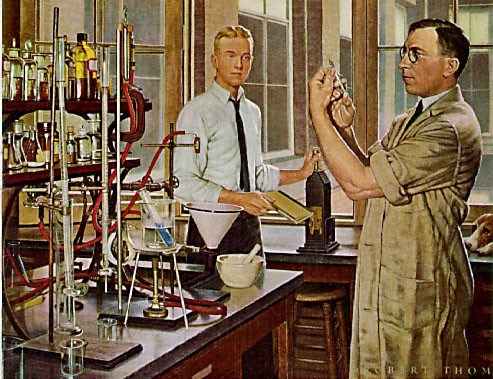 |
My hero is the main inventor of a medicine which has saved almost millions of lives with this great invention, including mine. For this reason, my hero is Sir Frederick Grant Banting, the great Canadian inventor of insulin.
A reason why insulin is such an important discovery and invention is because of type 1 diabetes, a condition in which a person is unable to produce his or her own insulin. Insulin is vital to the body because it takes the sugar, which you get from eating food, and transfers the sugar into your blood cells. If you are unable to produce your own insulin, the sugar in your blood cannot get into the cells, which will lead the cells to die and will cause a build up of sugar in your blood. Type 1 diabetes is fatal unless treated with the insulin Fredrick Banting discovered and invented.
Sir Fredrick Banting was born November 14, 1891 in the bedroom of a farm house in Alliston, Ontario. Banting was educated in local public schools and was later accepted into The University of Toronto to study divinity, but later started studying medicine. In 1916, he joined the army as a medic during World War 1. Interestingly enough, he had tired to join the army as infantry before he went to university, but had been refused due to poor eyesight. During the Battle of Cambria, he was wounded, but tried to help others, even with the wound, before he was told to stop and rest. In 1919, he was awarded the Military Cross of Heroism for the people he had helped in the battlefield.
Around 1922, Banting became very interested in diabetes after reading about it in a medical paper article. In the article, he read about how diabetes was caused by a lack of a protein hormone, which one of the scientists in the article called insulin, found in the pancreas. He read about how feeding patients a pancreas to solve the problem had failed due to the insulin being destroyed in the stomach. After doing some more research, Banting was determined to invent insulin. Banting went to various people to discuss his idea and what he wanted to do. Among the people he talked to was J. J. R. Macleod, a professor at the University of Toronto who gave him the facilities to do his work, and Charles Best, who was a medical student and was appointed to be his assistant. Together, Banting and Best started their work, which lead to the discovery on insulin.
 |
In 1922-1923, Banting won numerous awards for his work including the Nobel Prize in Physiology or Medicine and the Canadian Parliament granted him a Life Annuity of $7,500. He was also appointed as Senior Demonstrator in Medicine at the University of Toronto and was appointed Honorary Consulting Physician to the Toronto General Hospital, the Hospital for Sick Kids and the Toronto Western Hospital. And finally, Banting was knighted in 1934 after all his work for Canada and Britain.
In 1938, he became interested in aviation medicine, which lead him to joining the Royal Canadian Air Force. He was researching physiological problems that pilots faced when using high altitude combat aircraft. But, Banting died in 1941, at the age of 49, after the plane he was driving crashed while testing out a flying suit developed by a colleague Wilbur Franks.
Banting’s death is a tragic one because of how young he was and because of how much potential he had in medicine. But Sir Fredrick Grant Banting will always be remembered for his invention of insulin in Canada and around the world.
Page created on 12/4/2010 12:00:00 AM
Last edited 12/4/2010 12:00:00 AM
